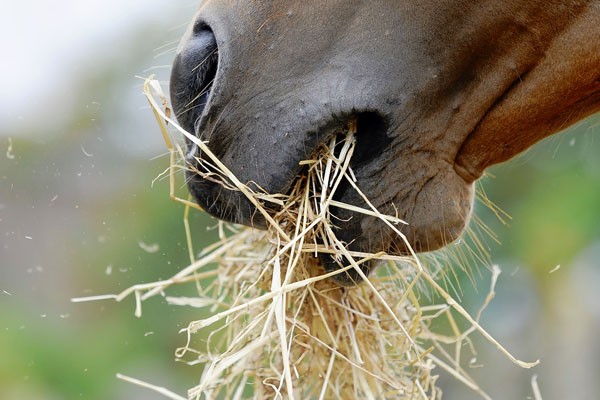
The effect of forage presentation on feed intake.
There are many haynets on the market designed with small holes and are advertised as being able to slow forage intake. However, studies have given conflicting results about mesh size and feed intake behaviour. This study aimed to compare the effect of four currently available haynets on feed intake behaviour in stabled horses.
Feed intake behaviour was measured in twelve horses using four types of haynets with different mesh sizes. A 10-day feeding phase was used for each haynet. Measurements were taken at the beginning, middle and end of each phase. Continuous observation was used to measure number of chews, number of bites from haynet and number of bites from floor. Night observations were undertaken in order to record long term intake behaviour
Results showed more chews per minute for the Large hay net when compared to the other types due to a reduced bite rate. The haynet with the smallest mesh (the Eliminet) showed a significant decrease in intake time per 1 kilogram of forage when compared to the Large haynet. Furthermore, haynets with smaller meshes slowed down feed intake by increasing the intake time with 5 minutes per kilogram. No differences between the haynets were found at night.
In conclusion, haynets with smaller holes (25-30mm) are likely to increase the feed intake time of horses. However, further research is warranted to investigate additional methods to increase feed intake without increasing calorie intake for stabled horses.
For more information about the effects of nutrition on behaviour and physiology please read the following articles:
Elia, Erb and Houpt (2010) Motivation for hay: Effects of a pelleted diet on behavior and physiology of horses (pdf)
Have you ever thought about a way to increase the feed intake time of your horse?
Do you think there is a link between feed intake behaviour and obesity? And between feed intake behaviour and digestive problems (ulcers, for example)?
Is it possible that current management strategies (high amount of concentrates, no access to pasture/ forage 24h a day) are a cause of this?
> From: Ellis et al., Appl. Anim. Behav 165 (2015) 88-94. All rights reserved to Elsevier B.V.. Click here for the online summary.


